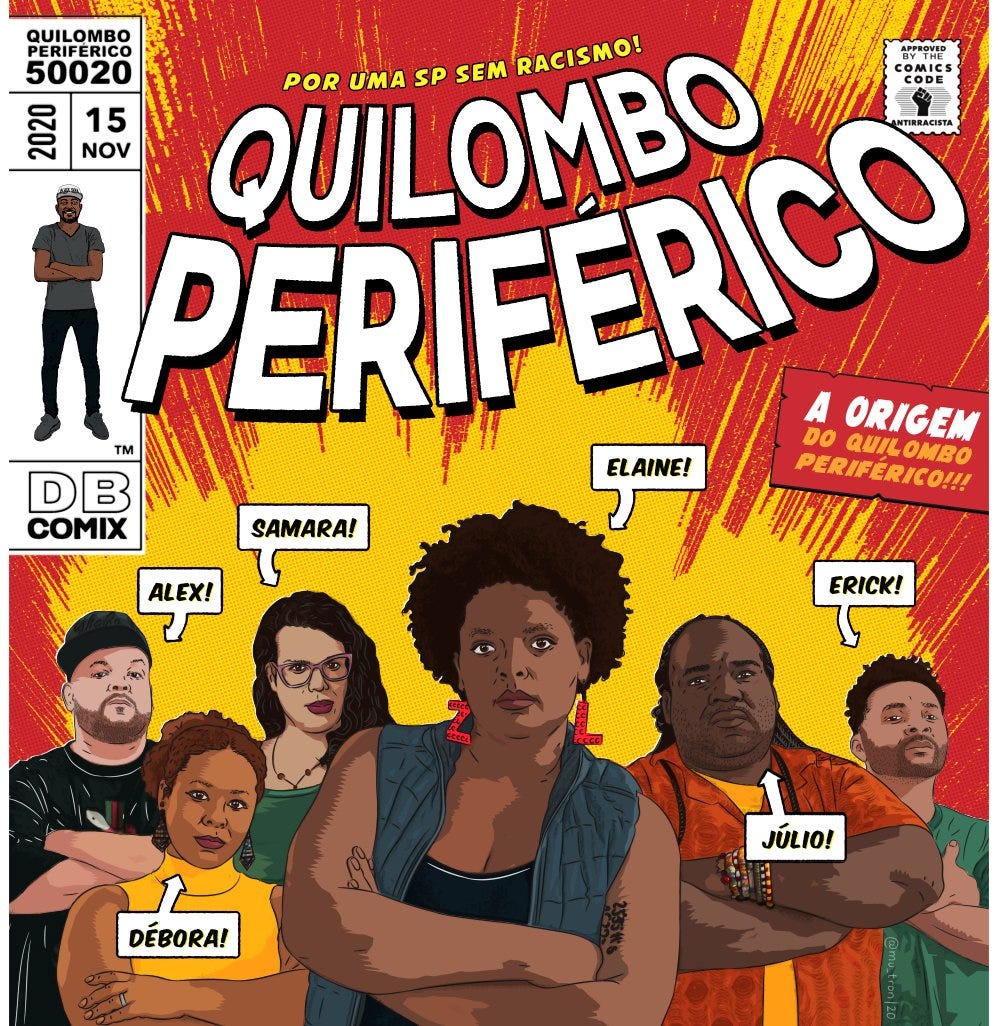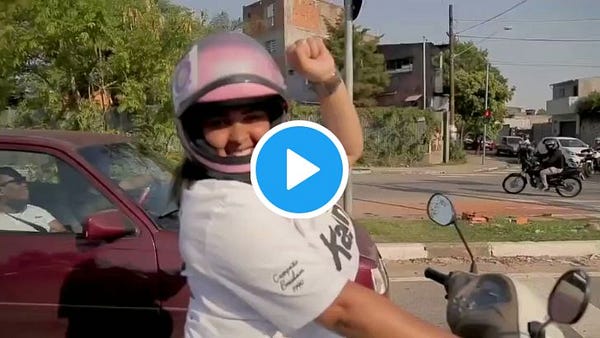Black Women Elected to Brazil's City Councils Record-Breaking Numbers
Here's why Brazil's elections will never be the same.
This is an independent publication that focuses on Black Brazilian news, culture, tourism, history and politics. Please sign up to the newsletter if you want to receive updates about what is going on with our brothers and sisters in Brazil.
Last Sunday, November 15, Brazilians went to the polls to vote for their city council members and mayors. In this post I list the factors that led to the election of Black Brazilian women in unseen numbers.
If you aren't familiar with the Brazilian Voting process, check out this quick primer.

Marielle's Sementes: Black women were elected to city councils across Brazil in record-breaking numbers
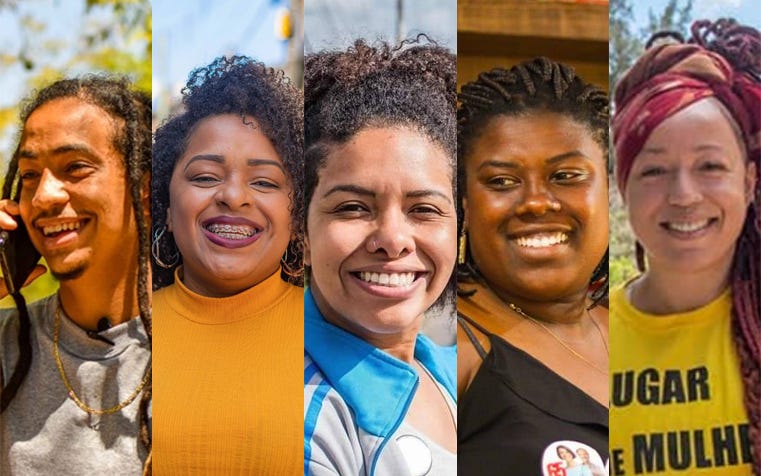
The legacy of Marielle Franco continues its impact. Black Brazilian women were scored record-breaking political victories. São Paulo will have four black women among its ranks - after 12 years without ANY black women. In Belem, a city in the Amazon, at least three Black women were elected to the city council. Curitiba elected its first Black woman to its city council, Carol Dartora (PT), and she received the most votes of anyone. She plans to use her position to promote the rights of Black Brazilians.
“I think it's a shame when a black person gets elected and doesn't claim to be a representative of the racial agenda. I can't help seeing the world for what I am, a black and hard working woman,” she said.
Porto Alegre elected FIVE Black people to its city council, including four black women. The city is only 13% Black but has traditionally had one of the strongest Black social movements, and this year's elections proved this. But these elected women aren't just Black. They adhere to anti-racism values and women who strive to improve conditions for Blacks in Brazil. Most of these black women politicians PSOL and Worker's parties. This is not a rule, however. The most voted woman in Salvador's city council is Ireuda Silva. She's a member of the center-right Republicanos and has always fought for Blacks and women's rights. Ironically, Rio de Janeiro actually elected four black women to its city council, but only two are leftists who will promote anti-racist and feminist values - Tainá de Paula (PT) and Thais Ferreira (PSOL).
Black numbers were up across the board
According to Brazil's election council, the number of candidates declaring themselves preto or pardo, the two census options that makeup Black in Brazil, exceeded whites this year for the first time - 49.9% versus 48.1%. Like all things in Brazil, this number is complicated. As Black protagonism has grown, many people who used to self-declare as white are now declaring themselves as pardo. Whether or not they are actually pardo (always a complicated category) is up for debate. For example, 13 Black women federal deputies have declared themselves pardo or preta. But a more in-depth look reveals that at least two would not be referred to as Black by the average person in Brazil.
According to the TSE, pardos and negros will make up 44 percent of the city councils throughout the ENTIRE country. In Palmas, Tocantins 22 of the 23 city council spots were won by people who self-declared as pardo or negro.
Trans women were elected to City Councils in numbers unseen before

In 2018, Ericá Malanguinho became the first transgender woman elected to a statewide political position in Brazil. But her impact was felt throughout Brazil—her social media posts promoting trans rights and the right to housing traveled FAR. This year, 15 transexual and travestis were elected to city councils throughout Brazil, including Erika Hilton (PSOL), the most voted woman in São Paulo. A few were even elected in small-town Brazil.
Vote Em Preta - Black Brazilians pushed for Blacks to Vote BLACK!
I've experienced three elections in Brazil (2016, 2018, 2020), and never have I heard the call for Black people to vote for Black candidates so strong. Black people gonna vote for Black candidates, right? Coming from America, this seems obvious. That's not so much the case in Brazil. Let's look at Rio. Rio de Janeiro is at least 50% black, but congresswoman Benedita da Silva (the only mayoral black candidate) only received 12 % of the vote. This is strongly tied to how Brazilians internalize their Black identity. But this is slowly changing. As more Black Brazilians consciously assume their Black identity, more people will certainly consciously vote Black.
Several groups even built a platform to support Black women candidates. It clearly worked well!
Black Brazilians obtained a Supreme Court victory to receive election funding in parity with their white counterparts. But the reality was much different.
Educafro and PSOL brought a lawsuit to the Supreme Court, arguing that black political candidates should receive funding from their political parties in parity to their white counterparts. The Supreme Court ruled in their favor, and the hope was that Black candidates would benefit immediately.
But that wasn't quite the case.
Whites still received about 65% percent of the electoral funds. And this Folha article pointed out that even the PSOL party didn't follow the rules that it was fighting for. In São Paulo, Keit Lima ran for the PSOL party and received 9k Reais, while her white counterpart, Toninho Vespoli, received R$100k.
"The value offered by the party to my candidacy is an offense not only to me, but to the entire group of black women who for various reasons do not directly build the party, but build grassroots movements," Lima said in a letter.
Keit Lima won 10,000 votes, and Vespoli won 26,748 votes. So where was the money spent more efficiently? If you analyzed the cost of a vote for Black women versus the cost of a vote for white men, you would find that Black women use their money much more efficiently.
Or, in other words, if Black women candidates were financially supported in numbers comparable white men candidates, they would probably win more seats than white men.
Anti-Racism, Feminism and & Black Voting Platforms Flourished
In August, the Instituto Marielle Franco released a political platform called Agenda Marielle that listed Marielle Franco's political values: 1) Racial justice and the defense of life 2) Gender and Sexuality 3) Favela Rights 4) Economic Justice 5) Free quality public health 6) Free public education 7) Culture, Entertainment & Sport.
When political candidates signed this document, they agreed to uphold these values. More than 700 candidates signed the document, many of them Black women.
In November (a bit late to have an impact), the Anti-Racist platform was launched. Similar to the Agenda Marielle, it encouraged candidates to agree to anti-racist political values. It also attempted to promote black candidates. It will be interesting to see if the platform takes off. I've found that Brazilians (Blacks included) tend to be more open to platforms that aren't race-specific.
Collective Candidates Are IN. They are winning! Black Collectives Won!
In recent years, the PSOL political party has embraced a new type of political candidate: the collective. A collective candidate is made up of several people and usually represents diverse identities. A collective can only use one person's personal identity number to register as a candidate. But they will split the city council salary and work together to promote public policy and represent the people who elected them.
The Quilombo Periférico was elected to the São Paulo city council. Its six members are black and from São Paulo's suburbs, but they are diverse in sex, sexual preference, and expertise. The Pretas de Salvador collective was elected in Salvador. All members are black women, but one is a lesbian, another is a Candomblé follower, and another is a mother (amongst a slew of other identities). These are examples of all-black collectives, but many others are racially diverse and, in general, always have conscious black representation.
Benedita lost, and Salvador got its first black mayor (NOT!).
In my last article, I hinted that congresswoman Benedita da Silva did not have a real chance of making it to the second round of Rio de Janeiro's mayoral race. She tied for third with Martha Rocha with 11% of the vote. This was expected because leftist parties needed to unite to overtake current Rio mayor Marcelo Crivella and ex-mayor Eduardo Pães—two white men who ran the city into the ground. Regardless, da Silva is still a legend.
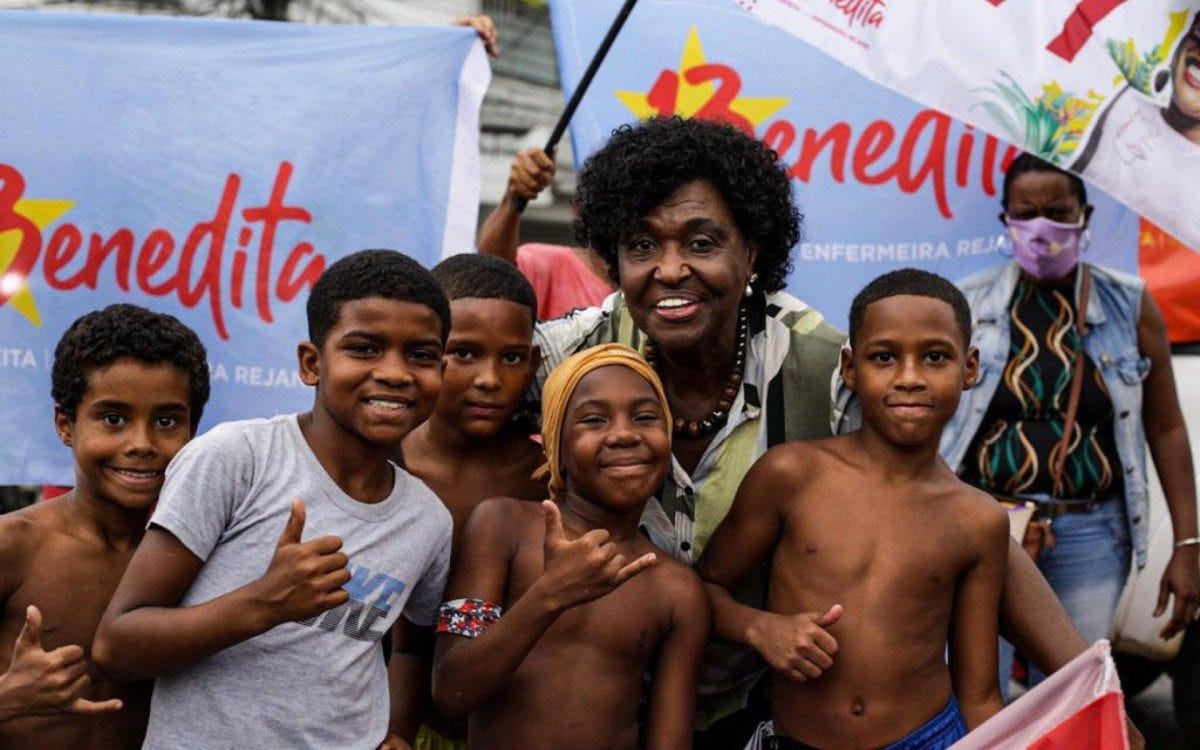
On the other hand, Salvador scored its first black mayor—at least on paper. The city, which is 80% black, elected Bruno Reis (DEM) as mayor. The previous mayor, ACM Neto, endorsed him. In 2014, Reis self-declared as white, and in 2016 he changed it to pardo. Race is quite fluid in Brazil, but I could easily argue that he is not a black man in Salvador. Let's just say that Brazil's Black movement is not celebrating his win.
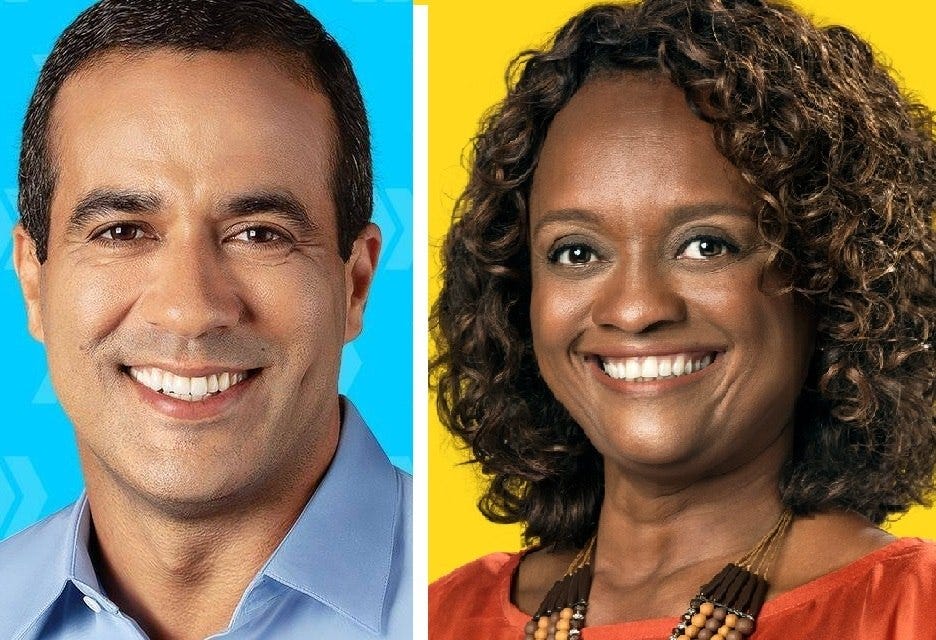
There were two black women in the race. Military police Major Denice (PT) finished second to him with over 20% of the vote. I loved Olivia Santana's (PCdoB) Salvador Mayoral campaign. Check out this tweet thread for some great music.


In Goias, a quilombola, Vilmar Kalunga, was elected as mayor (name). Quilombos are typically rural, black self-sustaining communities. This year more than 50 quilombolas won their city council elections.
A New Standard for Leftist Black Male Political Candidates?
Emerson Osasco was elected as a vereador in Osasco. Did he create a new type of campaign for the leftist man? Check out the tweet below to understand.







